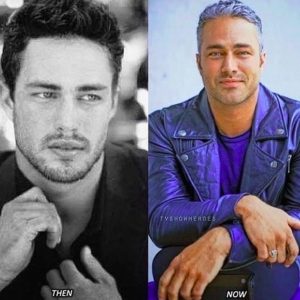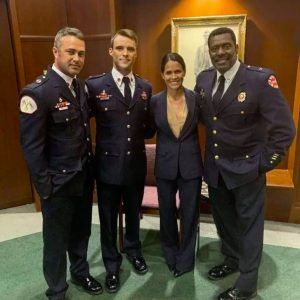In Chicago Fire Season 13, Episode 10, titled “Chaos Theory,” Joe Cruz’s intense storyline regarding the Flaco situation reaches a resolution, though not exactly in the way fans might expect.
This episode, while providing closure for Cruz, is overshadowed by an overall sense of chaos, with several subplots not fully developed. The main focus remains Cruz, whose personal turmoil
over the death of Junior Polanco continues to drive the narrative. While other characters are present, their roles feel more like filler in anticipation of the upcoming One Chicago crossover event.

The episode kicks off where the previous one left off, with Cruz grappling with the decision of whether to come forward about the shooting that killed Junior. While Cruz’s emotional journey is explored, the resolution feels somewhat rushed. Cruz’s behavior raises red flags, drawing attention from Firehouse 51, and the situation intensifies when the investigation into the Humboldt Park fire, which led to Flaco’s death, gains traction. Kelly Severide, utilizing his arson investigator expertise, becomes involved, adding depth to the storyline and creating tension. However, the core issue surrounding Cruz is dealt with relatively quickly, making the resolution feel less satisfying for those invested in his arc.
While it’s heartening to see Cruz confronting his guilt and his responsibilities, the episode falls short on suspense. A significant turning point comes when Cruz decides to confess to Chicago PD’s Kevin Atwater. This scene holds emotional weight, especially with Atwater’s compassionate response, but the episode skips ahead abruptly, leaving out the intensity of Cruz facing potential legal consequences. Instead, the narrative shifts to a brief meeting with a new State’s Attorney, who informs Cruz that he won’t face criminal charges. The resolution of Cruz’s suspension, set at two weeks, feels underwhelming, given that fans know Cruz will return almost immediately due to the upcoming crossover.
Despite the disappointment in the handling of Cruz’s storyline, the heart of the episode lies in the dynamic between Cruz and Severide. Their relationship takes center stage in the best scene of the episode, where Cruz opens up to Severide, reflecting on his growth as a person. Taylor Kinney’s portrayal of Severide is crucial in showcasing that Severide’s support for Cruz goes beyond friendship—he’s standing by him because the evidence clears him. This moment provides emotional depth, reaffirming the bond between the two characters.
Meanwhile, other subplots in “Chaos Theory” feel somewhat disjointed. Stella Kidd’s return sees her handling a community center affected by tear gas, but this storyline doesn’t fully connect with the audience due to its brief nature. Similarly, Mouch’s absence from the episode, likely due to budgetary cuts, leaves a noticeable gap in the narrative. A comedic subplot involving Ritter and Herrmann falls flat, as it’s mishandled and doesn’t deliver the anticipated humor. The love triangle between Violet, Sam Carver, and Violet’s boyfriend Flynn also moves forward but in a predictable, unremarkable fashion.
While “Chaos Theory” does have its moments, it largely serves as a bridge to the upcoming crossover, leaving certain plotlines feeling underdeveloped. The Cruz storyline, though impactful, is resolved in a way that feels rushed and anticlimactic. The episode sets up future events, but in doing so, sacrifices some of the emotional intensity that could have made it a standout in Chicago Fire’s long-running history. Nonetheless, Joe Minoso’s performance as Cruz, along with the emotional weight of his character’s journey, ensures that the episode is still worth watching for fans who care about his development.





